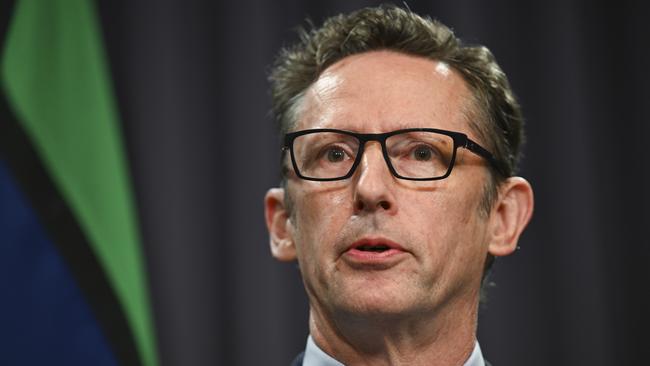Labor’s legislation backlog leaves genetic discrimination ban stalled
A major barrier to the genomics revolution remains standing, despite commitments by the Albanese government, with a ban on genetic discrimination stalled.

A ban on life insurance discrimination on the basis of genetics will not be legislated before the end of the year as the Albanese government faces accusations of a broken promise amid a backlog of planned legislation.
In September, Assistant Treasurer Stephen Jones announced the government would ban life insurers from accessing the genetic screening results of prospective customers in a bid to prevent discriminatory adjustments to premiums and denial of service.
Genetic tests can give insight into an individual’s probability of developing certain diseases, and how heritable that aspect of them is. It is largely unlawful to discriminate based on information in these tests, with one major caveat.
Risk-rated insurance, namely life insurance, is the one sector still cleared to change rates or refuse service based on someone’s predisposition to heritable diseases. Despite life insurers holding themselves to a partial prohibition on the practice since July 2019, with its own caveats, insurance discrimination remains the largest factor in why patients avoid seeking out testing.

Despite the government’s declared commitment to banning this practice, in the six weeks since the government’s pledge to legislate by the end of this parliamentary term, no draft bill has been made public and no indication has been given as to when the Albanese government would table a bill in parliament.
With the last sitting week of the year set to conclude on Thursday, and the prospect of an early election possibly in March raising the possibility that the Albanese government will not reconvene until a potential second term, it leaves the ban’s future uncertain.
If there were a change in government before the next opportunity to pass the legislation, it is unclear if the ban could still pass into law, or if a Coalition government would propose its own version of the legislation.
“I am getting multiple emails every week from clinicians, researchers and the public asking me whether the law has changed”, said genetic testing advocate Jane Tiller. “People don’t understand the difference between the announcement and an actual change in law, and it’s creating all this uncertainty. I constantly have to tell people there is no legislation yet – the protection that has been promised isn’t in place yet.”
Teal MP Kylea Tink probed Mr Jones on the delay in Wednesday’s question time, querying the lengthy wait. Mr Jones did not provide a time frame for when the legislation would be readied, but said the government remained committed to delivering it within this term.
“The government is committed to introducing legislation into parliament to remove the existing provisions which would allow life insurers to lawfully discriminate against people who have had access to genetic testing and require them to provide that genetic testing material as a condition of taking out life insurance,” he said.
“We are, as I said, committed to introducing legislation into the parliament in this term, there is only one day left in this year, it will not happen this year.
“But I can confirm to the member for North Sydney that work is under way on this issue and I have also had productive discussions with the Council of Australian Life Insurers, who have committed to ensuring that prior to legislation coming before this house, they will voluntarily introduce a ban to ensure that this material is not used in the way that we are all concerned about.”
It is understood a backlog in the parliamentary drafting office has caused the delay.
While the details of the Labor legislation are not yet available, Mr Jones outlined the main intentions in his September announcement.
Life insurers would be barred from altering rates or refusing service based on the outcomes of genetic testing, regardless of whether or not it showed likely inherited diseases for a patient or their family. Life insurers would still be able to use family history or personal diagnosis of disease in their underwriting, however.
He also confirmed the legislation would be enforceable by the industry regulator, the Australian Securities & Investments Commission. It would make the edict against discrimination a duty under insurers’ regulatory obligations.
Law professor Margaret Otlowski, who leads the University of Tasmania’s Centre for Law and Genetics, is impatient to see the ban instituted given its near-universal support from insurers, crossbenchers, Labor and the opposition.
“It’s pretty rare in politics that you end up with bipartisan support and a potential opponent not opposing – so it’s very frustrating,” she said.
“More profoundly, it’s the impact of the deterrent effect on people who might be considering genetic testing that they absolutely should worry about.”
Geneticist Paul Lacaze has been one of the most enduringly vocal supporters of the genetic discrimination ban as a co-founder of the Australian Genetic Non-Discrimination Working Group, which convened researchers, clinicians, lawyers and ethicists to bring the issue onto national agendas.
“It’s a black cloud that hangs over the whole genomics industry and fields from a research perspective and a clinical perspective,” Professor Lacaze said.
“It’s counterintuitive that we wouldn’t want to do everything we can to encourage proactive health behaviour, early detection of disease and prevention for our society, and for insurance systems.”





To join the conversation, please log in. Don't have an account? Register
Join the conversation, you are commenting as Logout